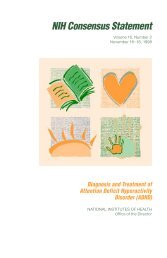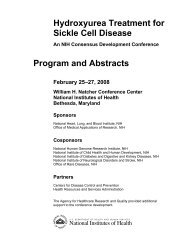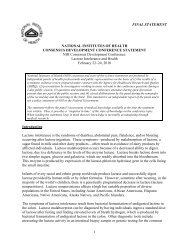Celiac Disease - NIH Consensus Development Program - National ...
Celiac Disease - NIH Consensus Development Program - National ...
Celiac Disease - NIH Consensus Development Program - National ...
Create successful ePaper yourself
Turn your PDF publications into a flip-book with our unique Google optimized e-Paper software.
Clinical Presentation of <strong>Celiac</strong> <strong>Disease</strong>in the Pediatric PopulationAlessio Fasano, M.D.Introduction<strong>Celiac</strong> disease (CD) is an immune-mediated enteropathy triggered by the ingestion ofgluten in genetically susceptible individuals. Gluten is a protein component in wheat and othercereals (rye and barley), and a staple food for most populations in the world. The majorpredisposing genes are located on the HLA system, namely the HLA-DQ2 and/or DQ8genotypes found in at least 95 percent of patients.CD can manifest with a previously unsuspected range of clinical presentations and canpresent at any age, including the elderly. However, typical cases often manifest in earlychildhood.Clinical Spectrum of CD in ChildrenThe clinical spectrum of CD in children is wide (1–7) (table 1). Typical forms of CD usuallypresent in young children with impaired growth, chronic diarrhea, abdominal distention, musclewasting and hypotonia, poor appetite, and unhappy behavior. Within weeks to months of startingto ingest gluten, weight gain velocity decreases and finally weight loss can be observed. Despitea wide variability between countries, classical CD still represents a common presentation in thepediatric age group.Table 1. Clinical Manifestations of <strong>Celiac</strong> <strong>Disease</strong> in PediatricsClinical FormTypicalAtypicalHistological and Clinical ManifestationsFully expressed enteropathyIntestinal symptoms, e.g., chronic diarrhea, weight loss, abdominal distentionFully expressed enteropathyExtra-intestinal manifestations, e.g., iron deficiency, short stature, osteoporosisSilentFully expressed enteropathyMinimal complaints or symptom-free (occasionally discovered by serologicalscreening)PotentialMinimal changes enteropathy or normal small intestinal mucosaSometimes symptomaticAtypical CD is characterized by unusual intestinal complaints (e.g., irritable bowelsyndrome–like, nausea, vomiting) or by extra-intestinal manifestations (e.g., short stature,61







